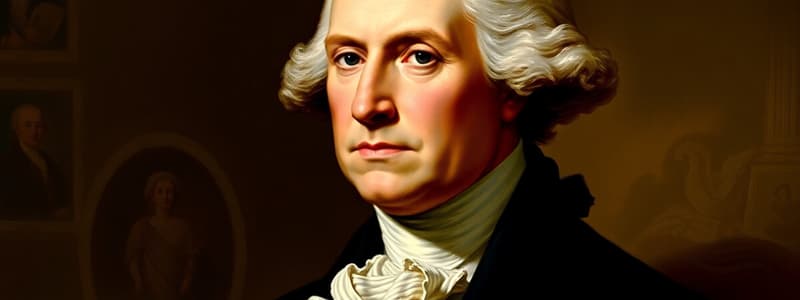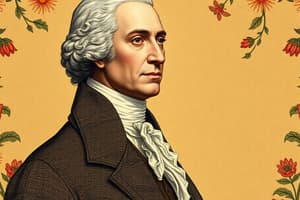Podcast
Questions and Answers
Which of the following best describes the significance of George Washington's first presidency?
Which of the following best describes the significance of George Washington's first presidency?
- He solely focused on foreign policy, setting the standard for future presidents' international relations strategies.
- He avoided creating any formal advisory bodies, preferring to rely on his own judgment in decision-making.
- He established precedents for the office, shaping the role and expectations of the president for future leaders. (correct)
- He primarily focused on military affairs due to his background, leaving domestic policy to his cabinet members.
What was the primary reason George Washington accepted the presidency despite his personal reservations?
What was the primary reason George Washington accepted the presidency despite his personal reservations?
- He was primarily motivated by the potential for personal wealth and power that the office offered.
- He felt obligated by his sense of duty to the nation, despite his desire to remain in Mount Vernon. (correct)
- He aimed to continue his military leadership, believing the nation needed a strong commander-in-chief.
- He was pressured by political factions who sought to exploit his popularity for their own agendas.
What was the composition and purpose of the first Cabinet assembled by George Washington?
What was the composition and purpose of the first Cabinet assembled by George Washington?
- It was formed primarily to handle ceremonial duties and public relations, with little involvement in policymaking.
- It consisted of personal friends and family members who provided informal advice on various matters.
- It comprised leaders from opposing political factions to ensure diverse perspectives and prevent partisan decisions.
- It included appointed department heads such as Secretary of State and Secretary of the Treasury to advise on specific areas. (correct)
How did George Washington's inauguration ceremony reflect the significance and solemnity of the event?
How did George Washington's inauguration ceremony reflect the significance and solemnity of the event?
What was James Madison's dual role during the early years of George Washington's presidency, as described in the content?
What was James Madison's dual role during the early years of George Washington's presidency, as described in the content?
What was a significant demographic trend in the early years of the United States, as revealed by the census data around 1790?
What was a significant demographic trend in the early years of the United States, as revealed by the census data around 1790?
Which factor significantly contributed to the United States' rapid population growth in its early years?
Which factor significantly contributed to the United States' rapid population growth in its early years?
How did John Adams's personal preferences and beliefs influence his political views and leadership style?
How did John Adams's personal preferences and beliefs influence his political views and leadership style?
What challenges did John Adams face during his presidency related to the Executive Mansion (White House) and the newly developing Federal City?
What challenges did John Adams face during his presidency related to the Executive Mansion (White House) and the newly developing Federal City?
How did the Alien and Sedition Acts impact the political landscape of the early United States?
How did the Alien and Sedition Acts impact the political landscape of the early United States?
What was the primary motivation behind the passage of the Alien and Sedition Acts during Adams' presidency?
What was the primary motivation behind the passage of the Alien and Sedition Acts during Adams' presidency?
Why were the Alien and Sedition Acts considered controversial and potentially unconstitutional at the time?
Why were the Alien and Sedition Acts considered controversial and potentially unconstitutional at the time?
What was John Adams's perspective on the role of the common people in governance, and how did it differ from that of someone like Benjamin Franklin?
What was John Adams's perspective on the role of the common people in governance, and how did it differ from that of someone like Benjamin Franklin?
In what way did the historical context of the late 1790s – specifically the conflict between France and England – influence John Adams's presidency?
In what way did the historical context of the late 1790s – specifically the conflict between France and England – influence John Adams's presidency?
How did the circumstances surrounding George Washington's death contribute to the development of the nation's capital?
How did the circumstances surrounding George Washington's death contribute to the development of the nation's capital?
Flashcards
George Washington
George Washington
The first president of the United States, unanimously elected.
April 30, 1789
April 30, 1789
The date George Washington was inaugurated as president.
President's Cabinet
President's Cabinet
A group of advisors appointed by the president to head the executive departments.
Secretary of State
Secretary of State
Signup and view all the flashcards
Secretary of the Treasury
Secretary of the Treasury
Signup and view all the flashcards
First U.S. Census
First U.S. Census
Signup and view all the flashcards
John Adams
John Adams
Signup and view all the flashcards
Size of early US Government
Size of early US Government
Signup and view all the flashcards
First White House Resident
First White House Resident
Signup and view all the flashcards
Alien & Sedition Acts
Alien & Sedition Acts
Signup and view all the flashcards
The Alien Act
The Alien Act
Signup and view all the flashcards
The Sedition Act
The Sedition Act
Signup and view all the flashcards
Constitutionality of Alien & Sedition Acts
Constitutionality of Alien & Sedition Acts
Signup and view all the flashcards
Richard Henry Lee on Washington
Richard Henry Lee on Washington
Signup and view all the flashcards
Death of Washington
Death of Washington
Signup and view all the flashcards
Study Notes
- At 57 years old, George Washington was unanimously elected as the first president of the United States.
- Washington reluctantly left Mount Vernon due to his sense of duty.
- The trip to New York City took 8 days because each town greeted Washington.
- In Philadelphia, he rode a white horse into the city.
- In NYC, Washington was rowed across the Hudson River on a decorated barge.
- On April 30, 1789, Washington wore a plain brown suit made of American cloth.
- On the balcony of Federal Hall, Washington took the oath of office.
- Washington and Congress walked to St. Paul’s Church to pray for guidance.
First President
- George Washington set an example for all future presidents.
- Washington aimed to establish respect and admiration for the presidency.
- He rode in a yellow carriage pulled by six white horses.
First Cabinet
- Washington appointed a Cabinet of advisors to assist him.
- Thomas Jefferson was the Secretary of State
- Alexander Hamilton was the Secretary of the Treasury.
- Henry Knox was the Secretary of War.
- Edmund Randolph was the Attorney General.
- Samuel Osgood was the Postmaster General.
- James Madison wrote speeches for Washington and Congress.
- John Adams, the Vice President, also advised Washington.
- The entire federal government consisted of 350 people.
First Census
- The first census was taken in 1790 and has been taken every 10 years since.
- The population was 4 million people.
- 700,000 people were slaves.
- Native Americans were not counted in the census.
- Benjamin Franklin died in 1790 and was not counted.
- 95% of the population lived on farms.
- 1 million people lived in the frontier land.
- Most cities were port cities.
- America’s birth rate was twice as high as England’s, while the death rate was twice as low.
- The US doubled its population every 24 years for almost 100 years.
- The population grew from 4 million in 1790 to 63 million in 1890.
Second President
- John Adams was Washington’s Vice President and became the second president (1797-1801).
- Adams was a Federalist from Massachusetts.
- He was a Harvard-educated lawyer who got Washington to be the general and Jefferson to write the Declaration of Independence.
- Adams served as a diplomat to England.
- He was perceived as having grown "fat and mean" and fond of British customs.
- He believed only the educated should govern and distrusted the common people.
Executive Mansion (White House)
- John Adams was the first president to live in the Executive Mansion, later known as the White House.
- The Federal City was still under construction by enslaved people.
- Adams had trouble finding the White House and faced challenges like insufficient wood for fireplaces.
- Adams did not utilize slaves.
- Adams spent more time away from what would be Washington, DC
- The building was officially named the “White House” during Teddy Roosevelt's presidency in 1902.
Washington’s Death
- In 1799, George Washington got sick and died.
- His last words were, “I die hard, but I am not afraid to go”.
- Richard Henry Lee said of Washington that "Washington was first in war, first in peace, first in the hearts of his countrymen."
- After his death, the Federal City was named Washington, DC.
Alien & Sedition Acts
-
Adams believed his most important achievement was keeping the US out of war.
-
The US remained neutral in the conflict between France and England, angering the French.
-
In 1798, Congress passed the Alien and Sedition Acts.
-
The Alien Act made it more difficult for foreigners to become US citizens.
-
It was aimed at the French, many of whom were joining the Democratic Republicans.
-
Federalists favored England, while Democratic Republicans favored France.
-
The goal was to weaken the power of the Democratic Republicans.
-
The Sedition Act made it a crime for Americans to criticize the government.
-
Critics referred to Adams as "His Rotundity."
-
The goal was to weaken the power of the Democratic Republicans.
-
The Sedition Act was considered unconstitutional, violating the First Amendment rights of freedom of speech and the press.
-
The Supreme Court was too weak to intervene.
Studying That Suits You
Use AI to generate personalized quizzes and flashcards to suit your learning preferences.




